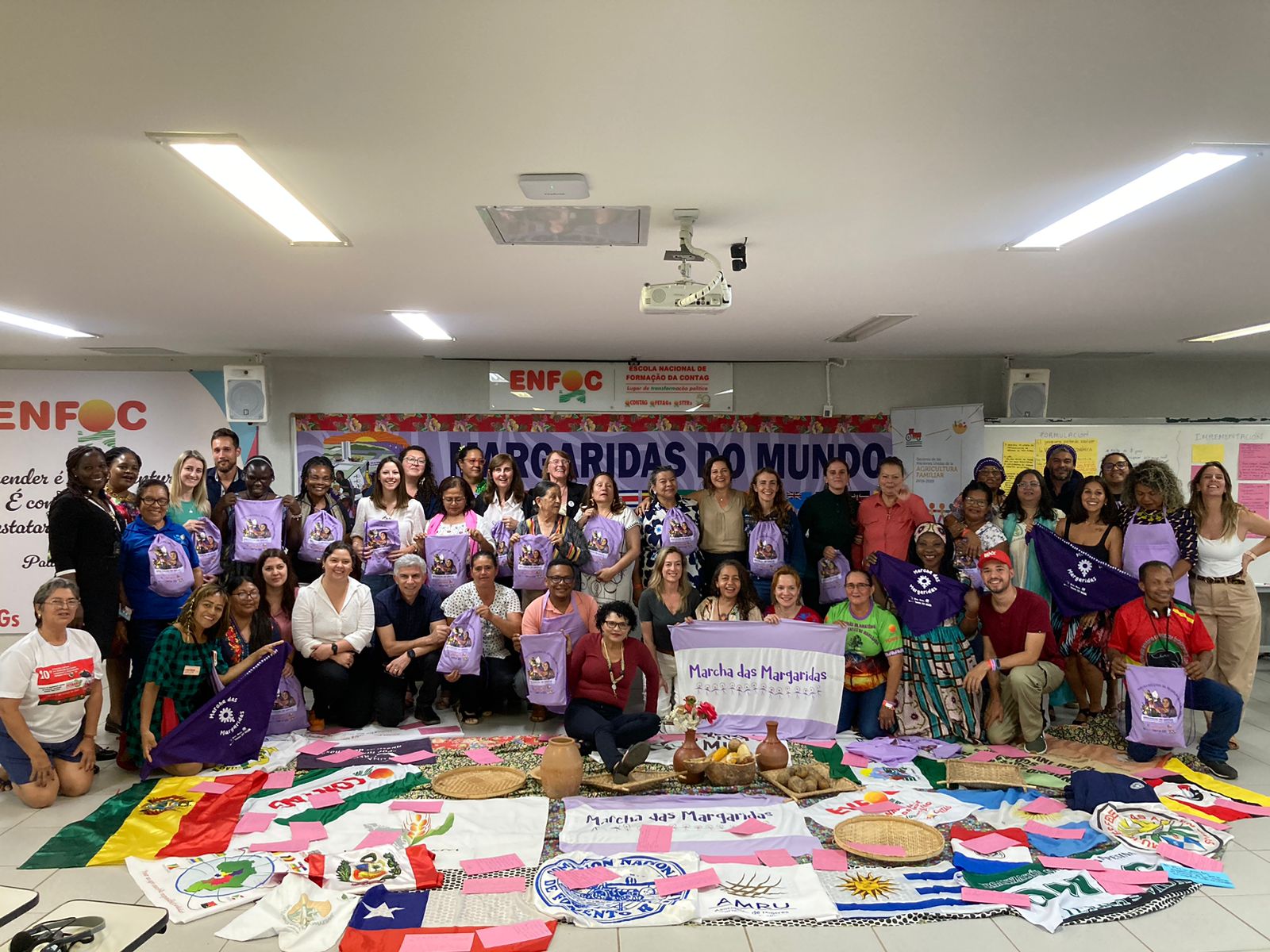The meeting culminated in a forward-looking declaration to shape future collaborative efforts.
Brasilia, Brazil – August 14-18, 2023.- The World Rural Forum (WRF), in collaboration with key partners, including the Confederação Nacional dos Trabalhadores Rurais Agricultores e Agricultoras Familiares (CONTAG), the Food and Agriculture Organization of the United Nations (FAO), and the International Land Coalition (ILC), organized the 2nd International Meeting of the Network of Rural Women in Action. Set against the vibrant backdrop of the VII Marcha das Margaridas in Brasilia, 87 women from 43 organizations spanning 26 countries in Africa, Asia, Europe, Latin America, the Caribbean, and the Pacific gathered within the framework of the United Nations Decade of Family Farming (UNDFF) 2019-2028.
Global Alliances and Transformative Dialogues
The core focus of this meeting was to strengthen global alliances among rural women, fostering transformative dialogues and collaboration between women representatives of family farming organisations and women’s organisations from five continents.
The workshop included training on public policies with a gender approach and triggered discussions on food systems, land tenure rights, family farming policies, climate change and other challenges relevant to women. It also strengthened their capacities to influence the policy cycle related to family farming, gender equity and rural women’s leadership.
Marcha das Margaridas: A Symbolic Movement
Held within the framework of the VII Marcha das Margaridas, the first two days of the event were dedicated to active participation in this strategic movement led by women rural workers of Brazil. The international delegation “Margaridas do Mundo” walked through the streets of Brasilia with over 100,000 women under the slogan “For the reconstruction of Brazil and for the good life”.
Following the March, the 2nd International Meeting of the Network of Rural Women in Action took place from August 17-18. Utilizing the “Learning Framework for inclusive, integrative and innovative public policy cycles for family farming,” developed by the joint FAO-IFAD Secretariat under the UNDFF, the WRF and FAO conducted a workshop to enhance the understanding of policy cycles and related policies among women representatives of family farming organizations.
Addressing Regional Priorities and Next Steps
The opening ceremony featured esteemed speakers such as Arístides Vera (President of CONTAG), Aparecida Gonçalves (Minister of Women’s Affairs, Brazil), Patricia Vasconcelos (Secretary of Family Agriculture, Ministry of Agrarian Development, Brazil), Guilherme Brady (FF Head of Unit, FAO, ), Cristina Timponi (Lead, Global Policy & Advocacy , ILC) Belén Citoler (Deputy director, WRF)) and Maria José Morais Costa (Women’s Secretary, CONTAG, Brazil).
Afterwards, the most relevant regional family farming organisations, including AFA, CANROP, COPROFAM, PDRR, PIFON, PROPAC and REFACOF presented the priorities of the rural women’s agenda in each region and the corresponding action strategies and actively participated in the training and discussions.
The 2nd International Meeting yielded profound outcomes, including strengthened capacities of women family farmers, enhanced participation and representation of rural women in decision-making processes, and the establishment of valuable alliances and partnerships with family farming organizations, international bodies, governments, and other stakeholders. The culmination was marked by the creation of a final declaration, serving as a guiding document for future collaborative efforts.
Pivotal Contributions to Empowerment
In conclusion, the 2nd International Meeting of the Network of Rural Women in Action emerged as a pivotal event in advancing the empowerment of rural women in family farming, aligning with the Pillar 3 of the UNDFF. It represented a collective effort towards enhancing capacities in the policy cycle from a gender perspective, influencing future policy-making processes, and promoting peer learning networks. Throughout the five-day meeting, activities were strategically designed to enhance women’s participation, alliances, and leadership in political, social, cultural, and economic equity processes.
More information:



